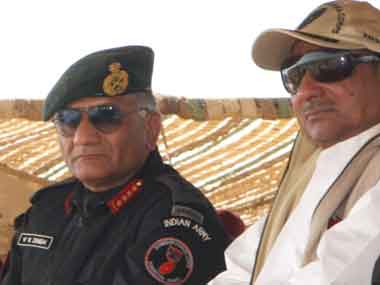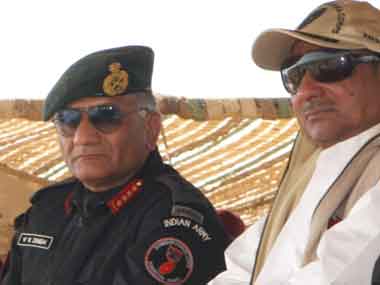In Ayn Rand’s gripping morality play Night of January 16th, the Objectivist philosopher-writer gets viewers to sit in judgement—literally—at a murder trial. One of the theatrical devices that the play invokes at each performance is to invite members from the audience to sit in as jury at the trial. The play, therefore has two alternative endings – one in which the jury finds the defendant “guilty” and the other not. The verdict varies at each performance, depending on the composition of the jury on a given day, and their bent of mind on the central philosophical exploration of the play: moral decay in society. Recent occurrences nearer home on the night of 16 January in and around New Delhi have forced us all as observers to sit in judgement today on another riveting drama, which too is centred around the larger theme of moral decay in society. The Indian Express reported this morning that unusual troop movements on the night of January 16 gave the civilian government the jitters in the context of a brewing conflict between the civilian government and the Army chief, General VK Singh. The word ‘coup’ was never invoked in the article—the nearest it came was to term it the ‘c’ word—but the sub-text right through painted the picture of a civilian government that expected the worst. [caption id=“attachment_266444” align=“alignleft” width=“380” caption=“Uneasy relationship. Image courtesy PIB”]
 [/caption] In the dead of the night, it confronted the military leadership and directed it to send the troops, which appeared to have been on a fairly routine training exercise, back to the barracks. The government’s liveliest apprehensions were stirred by the fact that the Army chief, General VK Singh, was to mount an unprecedented challenge to the civilian government that very morning by filing a petition against it in the Supreme Court in the ongoing dispute over the General’s date of birth. Of course, the Army, the defence ministry and the Prime Minister have all dismissed the report as baseless and needlessly alarmist. Yet, the facts presented in the article—that the government did scramble on the night of 16 January to defuse what it feared was an unprecedented army intervention with suspect intentions—are not in dispute. From the very vocal responses on public platforms, it appears that the jury in this “morality play” worthy of Ayn Rand—that is, all of us—have delivered a split verdict in the case. Some have pronounced the Army chief ‘guilty’ of ‘intimidating’ the government with the unreported troop movements. Others have exonerated him of the charge and have blamed the government for commissioning a “hit job” on the General through the media. But by far the most disconcerting response among a section of the chatterati on public platforms is the misplaced yearning for a “coup”. Some of them gave expression to a deep sense of disappointment that there had, in fact, been no coup attempt, or that it had failed. In this line of reasoning, the Army is seen as one of the last surviving institutions that commands respect, and as perhaps being best placed to carry out the surgery that many believe is required to fix the moral decay in society. It’s easy to see where the fount of that despair is: most of our democratic institutions today are seen to have been tarnished beyond repair. Faith in the government and in our parliamentarians is perhaps at its lowest, which is why anti-corruption activists like Arvind Kejriwal have been able to harvest that anger by bad-mouthing MPs even at the risk of being hauled up for breach of parliamentary privilege. Venal corruption—cutting across party lines—has tainted our politics, with each scam turning out to be bigger than the other. The judiciary has intervened in some high-profile cases of corruption and has been celebrated for that reason, but then the process is so laborious and time-consuming; and in any case not a single high-profile case of political corruption has ended in conviction. So, there’s plenty of angst to go around. Yet, when that angst gives way to a wholesale loss of faith in democratic institutions in their entirety and a yearning for an Army coup—however impossible it may be in an Indian context—as a quick-fix solution to our many failings, it reflects a colossal misunderstanding of our hard-won civilisational strengths. At a time when countries in our own neighbourhood—Pakistan, Bangladesh and Myanmar—are making the tortuous progress from military regimes to fledgling democracies, the very fact that there are still some of us who yearn to go against the tide of history is deeply troubling. The novelist Truman Capote noted that “more tears are shed over answered prayers than unanswered ones”. Anyone who prays for an Army coup as the surgery that will excise the moral decay in our society ought to be careful what they wish for. In any case, the cynicism that underlies that sentiment is far more ruinous to the aspiration to shape India for the better. Our democratic systems may be far from perfect, but they can always be perfected. Anyone who feels otherwise stands automatically disqualified from doing jury duty in the court of public opinion.
[/caption] In the dead of the night, it confronted the military leadership and directed it to send the troops, which appeared to have been on a fairly routine training exercise, back to the barracks. The government’s liveliest apprehensions were stirred by the fact that the Army chief, General VK Singh, was to mount an unprecedented challenge to the civilian government that very morning by filing a petition against it in the Supreme Court in the ongoing dispute over the General’s date of birth. Of course, the Army, the defence ministry and the Prime Minister have all dismissed the report as baseless and needlessly alarmist. Yet, the facts presented in the article—that the government did scramble on the night of 16 January to defuse what it feared was an unprecedented army intervention with suspect intentions—are not in dispute. From the very vocal responses on public platforms, it appears that the jury in this “morality play” worthy of Ayn Rand—that is, all of us—have delivered a split verdict in the case. Some have pronounced the Army chief ‘guilty’ of ‘intimidating’ the government with the unreported troop movements. Others have exonerated him of the charge and have blamed the government for commissioning a “hit job” on the General through the media. But by far the most disconcerting response among a section of the chatterati on public platforms is the misplaced yearning for a “coup”. Some of them gave expression to a deep sense of disappointment that there had, in fact, been no coup attempt, or that it had failed. In this line of reasoning, the Army is seen as one of the last surviving institutions that commands respect, and as perhaps being best placed to carry out the surgery that many believe is required to fix the moral decay in society. It’s easy to see where the fount of that despair is: most of our democratic institutions today are seen to have been tarnished beyond repair. Faith in the government and in our parliamentarians is perhaps at its lowest, which is why anti-corruption activists like Arvind Kejriwal have been able to harvest that anger by bad-mouthing MPs even at the risk of being hauled up for breach of parliamentary privilege. Venal corruption—cutting across party lines—has tainted our politics, with each scam turning out to be bigger than the other. The judiciary has intervened in some high-profile cases of corruption and has been celebrated for that reason, but then the process is so laborious and time-consuming; and in any case not a single high-profile case of political corruption has ended in conviction. So, there’s plenty of angst to go around. Yet, when that angst gives way to a wholesale loss of faith in democratic institutions in their entirety and a yearning for an Army coup—however impossible it may be in an Indian context—as a quick-fix solution to our many failings, it reflects a colossal misunderstanding of our hard-won civilisational strengths. At a time when countries in our own neighbourhood—Pakistan, Bangladesh and Myanmar—are making the tortuous progress from military regimes to fledgling democracies, the very fact that there are still some of us who yearn to go against the tide of history is deeply troubling. The novelist Truman Capote noted that “more tears are shed over answered prayers than unanswered ones”. Anyone who prays for an Army coup as the surgery that will excise the moral decay in our society ought to be careful what they wish for. In any case, the cynicism that underlies that sentiment is far more ruinous to the aspiration to shape India for the better. Our democratic systems may be far from perfect, but they can always be perfected. Anyone who feels otherwise stands automatically disqualified from doing jury duty in the court of public opinion.
Venky Vembu attained his first Fifteen Minutes of Fame in 1984, on the threshold of his career, when paparazzi pictures of him with Maneka Gandhi were splashed in the world media under the mischievous tag ‘International Affairs’. But that’s a story he’s saving up for his memoirs… Over 25 years, Venky worked in The Indian Express, Frontline newsmagazine, Outlook Money and DNA, before joining FirstPost ahead of its launch. Additionally, he has been published, at various times, in, among other publications, The Times of India, Hindustan Times, Outlook, and Outlook Traveller.
)